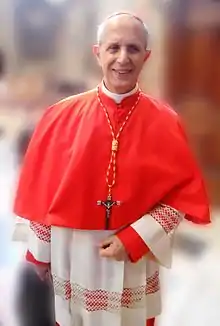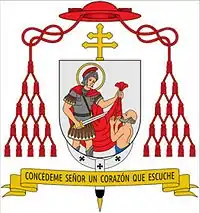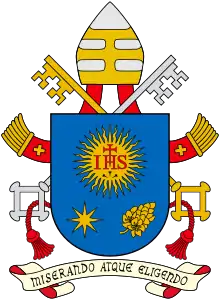Mario Aurelio Poli
Mario Aurelio Poli (Spanish pronunciation: [ˈmaɾjo awˈɾeljo ˈpoli]; born 29 November 1947) is an Argentine Cardinal of the Roman Catholic Church. He has served as the Archbishop of Buenos Aires since his installation on 20 April 2013, succeeding Jorge Bergoglio, who was elected as Pope Francis. He previously served as the Bishop of the Roman Catholic Diocese of Santa Rosa in Argentina
Mario Aurelio Poli | |
|---|---|
| Cardinal, Archbishop of Buenos Aires | |
 | |
| Archdiocese | Buenos Aires |
| Metropolis | Buenos Aires |
| See | Buenos Aires |
| Appointed | 28 March 2013 |
| Installed | 20 April 2013 |
| Predecessor | Jorge Bergoglio |
| Other posts |
|
| Orders | |
| Ordination | 25 November 1978 by Juan Carlos Aramburu |
| Consecration | 20 April 2002 by Jorge Mario Bergoglio |
| Created cardinal | 22 February 2014 by Pope Francis |
| Rank | Cardinal-Priest |
| Personal details | |
| Born | 29 November 1947 Buenos Aires, Argentina |
| Nationality | Argentine |
| Denomination | Roman Catholic |
| Previous post |
|
| Motto | "Concédeme Señor un corazón que escuche" ("Lord, give me a listening heart") |
| Coat of arms |  |
Ordination history of Mario Aurelio Poli | |||||||||||||||||||||
|---|---|---|---|---|---|---|---|---|---|---|---|---|---|---|---|---|---|---|---|---|---|
| |||||||||||||||||||||
| |||||||||||||||||||||
| Styles of Mario Aurelio Poli | |
|---|---|
 | |
| Reference style | His Eminence |
| Spoken style | Your Eminence |
| Informal style | Cardinal |
Early life, education, and presbyterate
Mario Poli was born in Buenos Aires in 1947. He began his philosophical and theological studies in 1969 at the Inmaculada Concepción Seminary in Villa Devoto. He obtained degrees as bachelor of social services at the University of Buenos Aires and as doctor of theology at the Pontifical Catholic University of Argentina. Poli was ordained a priest by Cardinal Juan Carlos Aramburu on 25 November 1978,[1] and led the Parish of San Cayetano in Liniers for two years.[2]
In 1992, the Archbishop of Buenos Aires Cardinal Antonio Quarracino appointed him Director of the Vocational Institute "Saint Joseph", place of formation of the future priests, where he exercised a peculiar and striking selective discrimination on the postulants or candidates to the entrance, for internal ideological, socio-economic reasons, for carrying face and geographical origin.
He obtained the title of doctor in Theology and was professor of ecclesiastical history and Patrology at the Argentine Catholic University.
Episcopal career
Pope John Paul II appointed him auxiliary bishop of Buenos Aires in 2002, and Pope Benedict XVI appointed him Bishop of Santa Rosa in 2008.[2][1]
Poli has opposed same-sex marriage in Argentina and commented that he would have a respectful but distant relationship with the administration of Argentine President Cristina Fernández de Kirchner,[3] a political stance similar to that of Bergoglio.[4] He has requested an increased dialogue between the church and the state.[5]
News of his appointment as Archbishop of Buenos Aires was leaked to the press on 27 March 2013, which was not well received by the church.[4] Poli's appointment was officially announced on 28 March and he was enthroned on 20 April at the Buenos Aires Metropolitan Cathedral,[6] taking the place of Jorge Bergoglio, S.J., who had been elected pope on 13 March. He received the pallium from Pope Francis in Rome on 29 June 2013.
Cardinalate
Poli was created Cardinal-Priest in the consistory of 22 February 2014.[7] and assigned the titular church of San Roberto Bellarmino, whose previous occupant was Bergoglio (now Pope Francis),[1] also from the see of Buenos Aires.
On 19 February 2014 he was appointed a member of the Congregation for the Oriental Churches and Pontifical Council for the Laity.[8]
Poli gave the homily for the Mass at the Buenos Aires Metropolitan Cathedral for the 2014 First National Government holiday. Poli quoted Francis and requested more political dialogue.[9]
See also
References
- "Archbishop Mario Aurelio Poli". Catholic Hierarchy. Retrieved 4 April 2013.
- "Mario Poli, el sucesor del papa Francisco como arzobispo de Buenos Aires" [Mario Poli, the successor of Pope Francis as archbishop of Buenos Aires] (in Spanish). La Nación. 27 March 2013. Retrieved 25 March 2013.
- "Poli advirtió que la relación con el Gobierno será 'con la debida distancia'" [Poli warned that the relation with the Government will be 'with the due distance'] (in Spanish). La Nación. 29 March 2013.
- Downes, Patricio (28 March 2013). "Desde la Iglesia confirmaron el malestar por la filtración" [The Church confirmed their discomfort with the leak] (in Spanish). Clarín. Retrieved 1 April 2013.
- Premat, Silvina (30 March 2013). "Mario Poli: 'Yo soy pastor y no político; no soy Bergoglio en eso'" [Mario Poli: "I'm a preacher, not a politician; I'm not Bergoglio in that"] (in Spanish). La Nación. Retrieved 1 April 2013.
- "Oficial: Mario Poli es el nuevo arzobipo de Buenos Aires" [Official: Mario Poli is the new archbishop of Buenos Aires] (in Spanish). La Nación. 28 March 2013. Retrieved 25 March 2013.
- "Pope Francis announces names of new Cardinals". Vatican Radio. 12 January 2014. Retrieved 13 March 2014.
- Glatz, Carol (31 March 2014). "Pope confirms heads of Vatican curial agencies". National Catholic Reporter. Retrieved 31 March 2014.
- "Frente a Cristina Kirchner, Mario Poli citó al Papa: "O se apuesta por el diálogo o todos perdemos"" [Mario Poli quoted the Pope next to Cristina Kirchner: "Either we bet for dialogue or everybody loses"] (in Spanish). La Nación. 25 May 2014. Retrieved 27 May 2014.
External links
- "Poli Card. Mario Aurelio". Holy See Press Office. Archived from the original on 15 October 2017. Retrieved 23 November 2017.
- Mario Poli
| Catholic Church titles | ||
|---|---|---|
| Preceded by Rinaldo Fidel Brédice |
Bishop of Santa Rosa in Argentina 24 June 2008 – 28 March 2013 |
Succeeded by Raúl Martín |
| Preceded by Jorge Mario Bergoglio |
Archbishop of Buenos Aires 28 March 2013 – present |
Incumbent |
| Ordinary of the Faithful of Argentina 4 May 2013 – present | ||
| Cardinal Priest of San Roberto Bellarmino (church) 22 February 2014 – present | ||
